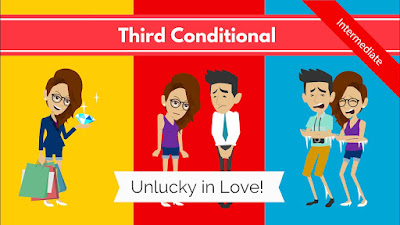Past Modals
Deberían tener, podrían tener, y tendrían, a veces se llaman "modales de oportunidad perdida" porque describen situaciones cuando imaginamos que el pasado fue diferente.
Antes de estudiar esos términos en el pasado, repasemos la diferencia entre should, could y would. La regla general es:
Antes de estudiar esos términos en el pasado, repasemos la diferencia entre should, could y would. La regla general es:
Antes de estudiar esos términos en el pasado, repasemos la diferencia entre should, could y would. La regla general es:
Ejemplos
- Should por recomendación / consejo“If you want to lose weight, you should eat healthy food.”
- Could por posibilidades“I have the day off tomorrow.”“Great! We could spend the day at the beach. Or we could go shopping.”
- Would para imaginar resultados“If I were rich, I would buy a boat.”
Should Have
El uso debería decir que se recomendó una acción diferente en el pasado.
- I should have studied harder! (= I didn't study very hard and so I failed the exam. I'm sorry about this now.)
- I should have gone to bed early (= I didn't go to bed early and now I'm tired).
- I shouldn't have eaten so much cake! (= I did eat a lot of cake and now I don't feel good.)
- You should have called me when you arrived (= you didn't call me and I was worried. I wish that you had called me).
- John should have left early, then he wouldn't have missed the plane (= but he didn't leave early and so he did miss the plane).
- His plane should have arrived by now (= if everything is fine, the plane has arrived).
- John should have finished work by now (= if everything is normal, John has finished work).
Could Have
El uso podría tener que hablar sobre posibilidades si algo hubiera sido diferente en el pasado.
- I could have stayed up late, but I decided to go to bed early.
- They could have won the race, but they didn't try hard enough.
- Julie could have bought the book, but she borrowed it from the library instead.
- He could have studied harder, but he was too lazy and that's why he failed the exam.
- I couldn't have arrived any earlier. There was a terrible traffic jam (= it was impossible for me to have arrived any earlier).
- He couldn't have passed the exam, even if he had studied harder. It's a really, really difficult exam.
Would Have
El uso tendría que imaginar un resultado (si algo hubiera sido diferente en el pasado):
- If I had had enough money, I would have bought a car (but I didn't have enough money, so I didn't buy a car).
- I would have gone to the party, but I was really busy.
(= I wanted to go to the party, but I didn't because I was busy. If I hadn't been so busy, I would have gone to the party.)
- I would have called you, but I didn't know your number.
(= I wanted to call you but I didn't know your number, so I didn't call you.)
- A: Nobody volunteered to help us with the fair
B: I would have helped you. I didn't know you needed help.
(= If I had known that you needed help, I would have helped you.)
Could have is often used with “if + had + past participle” (If I had gone / if she hadn’t fallen) – these “if” phrases express the imaginary past situation. However, in some cases you can use could have without the “if” phrase. Imagine you’re driving with a person who makes a dangerous maneuver on the road. You can say:If you arrive late at the airport and miss your flight, you can say:“If we had arrived earlier, we would have caught our flight.”If you forget your umbrella, and it starts to rain, and you get wet, you can say:“If I had brought my umbrella, I wouldn’t have gotten wet in the rain.”Would have expresses more certainty about the result than could have:“If I had worked harder, I could have gotten a promotion.” (maybe I’d get a promotion… but maybe not)On a test where you need 70% to pass: “I got a 68 on the test. If I had gotten two more points, I would have passed.”











